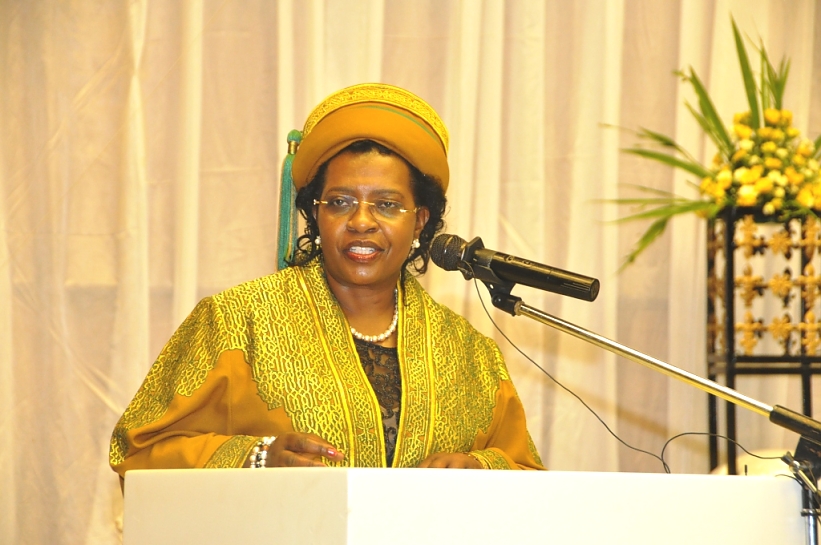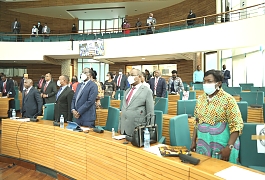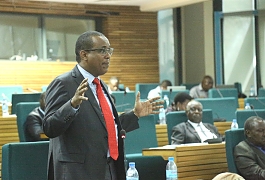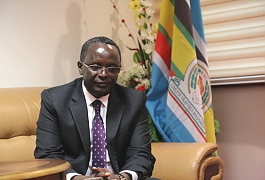The EAC is committed to enhancing access to quality education as a pre-cursor to greater investments in the education sector, specialization and creation of more job opportunities, East African Legislative Assembly (EALA) Speaker, Rt. Hon (Dr) Margaret Nantongo Zziwa has said. At the same time, the Speaker is calling for the speedy harmonisation of curricula and accreditation processes in higher education.
The Speaker made the remarks during the 10th convocation of the Aga Khan University held in Kampala, Uganda today. A total of 54 students were conferred at today’s graduation ceremony. Of these 26 students receiving a Bachelor of Science in Nursing while 28 others were honoured with a Diploma in General Nursing. 28 received Degrees in Nursing while 2 were honoured with a Diploma in Nursing.
Rt. Hon Zziwa remarked that regional integration would offer new opportunities in all sectors including tourism, trade, infrastructure development education and Health. She added that EALA would collaborate closely with the EAC Council of Ministers to ensure that the Inter University Council of East Africa (IUECA) Bill 2012 is brought to the house for debate and eventual assent. The Bill which is scheduled for discussion during the forthcoming Sectoral Council on Legal and Judicial Affairs next month, shall look into a number of key areas including accreditation, standardisation and quality.
The Speaker applauded the Aga Khan Development Network for its commitments in development programmes in the EAC Partner States and beyond, noting that it was a trail-blazer in socio-economic development. She remarked that there was need to train more nurses in the region and the contribution of the university in improving the quality of healthcare and healthcare workers was significant.
Rt. Hon Zziwa cited the work of the university as a perfect example of Private- Public- Partnerships in East Africa. Students who enroll for the Advanced Nursing Studies (AKU-ANS) Programme are from the private sector, government and faith based institutions in urban, rural and peri-urban centres where health services are needed the most.
She congratulated the graduands and called upon them to be ethical in their work. “You are in a unique position of understanding the culture and history of the region. I urge you to apply your education in improving the quality of life of fellow citizens and to uphold high integrity and dignity in their career”, the Speaker remarked.
The President of the University, Mr Firoz Rasul, remarked that the principles of quality, relevance, impact and access to health were key in the foundation of AKU for over 30 years and such continue to guide every aspect of the University's development. He emphasised the importance of quality in the delivery of healthcare and education whilst benchmarking the university against world class standards.
The AKU-ANS programme in East Africa provides high quality education that allows practicing nurses to study part-time. Admission is completely through a needs-based policy where merit is the sole criteria for selection. This education is provided at fees that cover on average only 20% of the cost of their diploma or degree. The balance is subsidised by the University.
AKU has graduated close to 1800 nurses in East Africa since its inception in 2001. According to its analysis, one trained nurse in the rural communities may serve up to 20,000 people, isolated by distance, poverty and lack of access to healthcare and support. A large number of East African nurses are certified below a qualified level and have not been trained in the management of new and re-emerging diseases that are compounding the poverty situation in Africa. In rural sites nurses are often the first point of contact for patients seeking health care services.
The colourful ceremony was attended by Vice-Chancellors, senior government officials, diplomats, national and international academicians and development partners among others.
NOTES:
Aga Khan University Founded by His Highness the Aga Khan in 1983, the University’s objective is “to be on the frontiers of scientific and humanistic knowledge” while inspiring students to be independent learners and researchers imbued with a spirit of service and respect for others. In the years since its founding, Aga Khan University’s major focus has been in the fields of health and education. For the decades ahead the University plans to step beyond success in these areas and become a more diversified university, both geographically and scholastically.
The University currently has programmes in eight countries spread over three continents. In East Africa, the University offers Advanced Nursing Studies programmes in Kenya, Uganda and Tanzania; and Postgraduate Medical Education in Kenya and Tanzania. These programmes are supported by a 250-bed teaching hospital, the Aga Khan University Hospital in Nairobi. The Institute for Educational Development, East Africa offers Master of Education degrees and certificate courses out of Dar es Salaam. In Pakistan, there is a Medical College; a School of Nursing; and a 560-bed teaching hospital, Aga Khan University Hospital; an Institute for Educational Development that includes Professional Development Centres in Gilgit-Baltistan and Chitral; and an Examination Board in Karachi. In London, UK, there is the Institute for the Study of Muslim Civilisations that offers a graduate degree in Muslim Cultures. The University is also working with the governments of Syria, Egypt and Afghanistan to improve nursing and medical education curriculum, teaching standards and clinical practice.
A Faculty of Health Sciences and a Graduate School of Media and Communication are being established in Nairobi whilst the Faculty of Arts and Sciences will be established in Arusha as well as in Karachi.
The University is also part of the Aga Khan Development Network, with links to institutions that can apply the University’s creative solutions in the field. The Network is a group of development agencies with mandates ranging from health and education to architecture, culture, microfinance, rural development, disaster reduction, and the promotion of private-sector enterprise and the revitalisation of historic cities.
As the University expands into new geographical and academic spheres, the institution seeks to further its vision as an international university serving primarily the developing and Muslim worlds. Through its high academic standard and programmes relevant to the needs of developing societies, its work as a dialogue partner with governments on issues of health and education policy, and its delivery of critical social services, the University is redefining education as it transcends national boundaries and strives to create a global learning community.
-End-
For More Information, contact: Bobi Odiko, Senior Public Relations Officer; East African Legislative Assembly; Tel: +255-27-2508240 Cell: +255 787 870945, +254-733-718036; Email: bodiko@eachq.org Web:
https://www.eala.org Arusha, Tanzania




